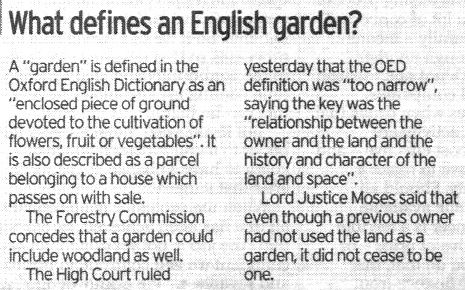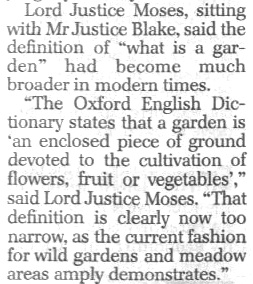

The definition of a garden - as may be relevant to appeals under Section 215 (s.215) of the Planning Acts.
There are no doubt many definitions of a garden. According to Britain in Bloom it might be an area where only ecologically useless flowers were allowed to grow - everything else being ruthlessly exterminated. Wider definitions would include areas of concrete, paving slabs, decking, vegetables, fruit trees, shrubs, ponds, grasses, trees, hedges, indeed any vegetation that was to the householder's choice and under his ownership or control. A central question is whether an area that has been left deliberately or by chance to 'go back to nature' for a few years or decades can legitimately be termed a garden.
This very question was the subject of a High Court case that dragged on for years - until in July 2008 the High Court ruled that the Oxford English Dictionary definition of a garden was these days 'too narrow'. The OED defines a garden as an 'enclosed piece of ground devoted to the cultivation of flowers, fruit or vegetables'. It also uses the word in an attributed sense to imply cultivated (rather than wild): thus the terms 'garden plants' or garden-cress'. The word 'enclosed' does not appear in the 1981 edition of the OED - maybe it was added in the Telegraph article. It is obviously incorrect: a garden doesn't need to be enclosed, and indeed may be forbidden from being enclosed if it forms part of an 'open plan' housing estate. The Chambers English Dictionary (1988 edition) has a similarly narrow definition of a garden: a piece of ground on which flowers, etc, are cultivated: a pleasant spot: a fertile region.
The case was reported in the Daily Telegraph of 5 July 2008 under the headline:
When is a garden not a garden?
The relevance of this case to s.215 appeals is that the High Court made specific reference to and acknowledged the existence of 'wild gardens and meadow areas' within the context of the definition of a garden. Indeed, the High Court made an important point - that gardening styles are a matter of fashion (and of course, fashion by its nature and definition changes with time). Exactly this point was made a decade earlier by Councillor Mrs Liverton of Sidmouth Town Council and East Devon District Council during the years of dispute centred upon the famous Sidford Wild Garden. She said in committee that 'various styles of gardening' were not a legitimate matter for enforcement under s.215 of the Planning Acts.


Extracts from an article in the Daily Telegraph of 5 July 2008
A poster produced for use around the Sidford Wild Garden in around 2000 is here. It will probably be another decade before a proper understanding of the benefits of environmentally friendly gardens permeate the dense undergrowth of many local councils. The next page shows some examples of long grasses sold by specialist gardening websites - these are allowed to be planted in all areas of the UK, except where local planning officers decide otherwise.